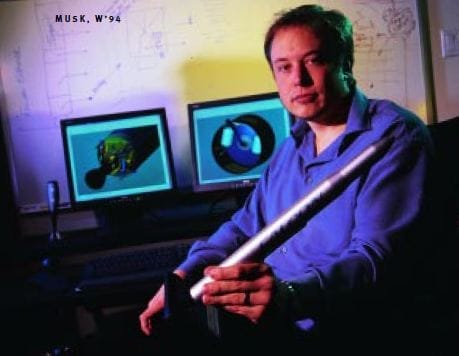Elon Musk, W’94, was a year from being born when Neil Armstrong took that first great leap for mankind onto the moon. But as Musk sees it, mankind needs a new goal for a greater leap, this time toward establishing human life on Mars.
“If we can go to Mars and beyond, that will be far more important in historical context than anything we do today,” said the 31-year-old entrepreneur.
While some critics may dismiss the idea of colonizing Mars, it may not be wise to put down any idea by Musk. In September, he was ranked number 23 in Fortune magazine’s “America’s 40 Richest Under 40,” having sold two Internet companies he founded: PayPal, an online payment service bought by eBay in February, and Zip2, an online city guide service bought by Compac in 1999.
Having reached inward into the Internet with those two companies, Musk has now decided to reach outward into space. His new company, SpaceX, is that first step he’s looking for toward Mars. SpaceX’s primary product is the Falcon Explorer, a rocket able to launch a half-ton payload into low Earth orbit. It is the first step on the way to making launchers more cheaply – thus getting products and people in space more cheaply. That, in turn, Musk hopes, will get NASA, or some private concern, to think about a push toward getting human civilization on Mars.
“There is a long-term benefit to humanity if we can produce lower-cost launch vehicles,” said Musk by phone from his California office. “If we can do that, it is important for humanity to expand. So, for me, there is a commercial element to it. There is a philanthropic element. And, fundamentally, rockets are fun.”
Musk grew up in South Africa and came to Penn to study physics, eventually getting his Wharton degree. He went to Stanford to get a PhD in high-energy physics but dropped out after founding Zip2 in 1995. He used part of his eight-figure buyout from Zip2 to begin PayPal, which went public just before being bought out by eBay. Though seemingly different, Musk views all three of his startups through a similar lens.
“For me, in anything I do, there are three things that are essential,” he said. “First, it has to be intrinsically interesting. It has to be fun to do, and all three of these companies were. Second, it has to be commercially viable. And third, if we are successful, it has to have a meaningfully positive effect on the world.”
Musk is not the only scientist/entrepreneur who is pushing people toward thinking that Mars is an important cog in the evolutionary machine. He has been a supporter of The Mars Society, a group mostly of scientists who believe the space program is making a mistake by not moving quickly to get man situated on Mars.
“I found Mr. Musk to be a sincere and interesting individual who believes that with the proper motivation, the funding can be raised to do a real Mars mission via the private sector,” said Maggie Zubrin, a board member of the Mars Society. “We wish him all success with his venture.”
Musk makes clear that there are certainly goals short of Mars for SpaceX.
“Basically, if our launcher were a car, it would be a compact,” said Musk, noting that the best option NASA has today is a Pegasus, made by Orbital Sciences, a $25 million rocket. He intends for SpaceX to make a launcher for $7 million, which would then make it impossible for NASA to ignore. “It doesn’t make sense to do something incremental – to make something, say, for $22 million just to undercut Pegasus.
“We want to borrow a page from Henry Ford, who didn’t invent the automobile but made every part of the process simpler and cheaper,” he said. SpaceX is planning on subcontracting out most of the technology of the launchers but has hired engineering chiefs who have formerly worked for NASA or major space-program contractors.
Still, Musk admits, even the creation of a low-cost satellite launcher leaves him several steps away from his Mars dream.
“I think to some degree, we got lost along the way with the space program,” he said. “There was this big push by President Kennedy. Back in the early 1960s, when he said our goal was to land a man on the moon in the decade, no one really knew how or if that could be accomplished. But the goal was there, so it happened.
“Then everything went sideways,” he said. “But now, anyone who says we should go to Mars still says one of the major obstacles is cost. If we can show them a lower-cost option, then I would hope a President can come out and give putting human civilization on Mars as a goal, like Kennedy did with the moon.”
Musk said Mars is the more likely candidate than the other obvious alternative, the moon, to house human civilization for a number of reasons. There are more minerals on Mars, he said, and the atmosphere is richer. There is water in the permafrost of Mars’ soil, but almost no water on the moon. Mars’ orbit around the sun is similar to Earth’s, as is its gravity.
“This is not about me going to Mars, like some play game,” he said. “I believe there should be thought out there that expanding human civilization to places where it has not been is important. And I believe that getting it to Mars is an important goal for humanity.
“I am trying to do it in a practical way, to try to find the commercially viable technology to get us there,” said Musk, who said that, in a way, a launch vehicle is easier than PayPal. We’ve known longer, he said, that space exploration works. The Internet as a commercial medium is a comparatively new phenomenon. “Now we just have to get to some next steps.”


























